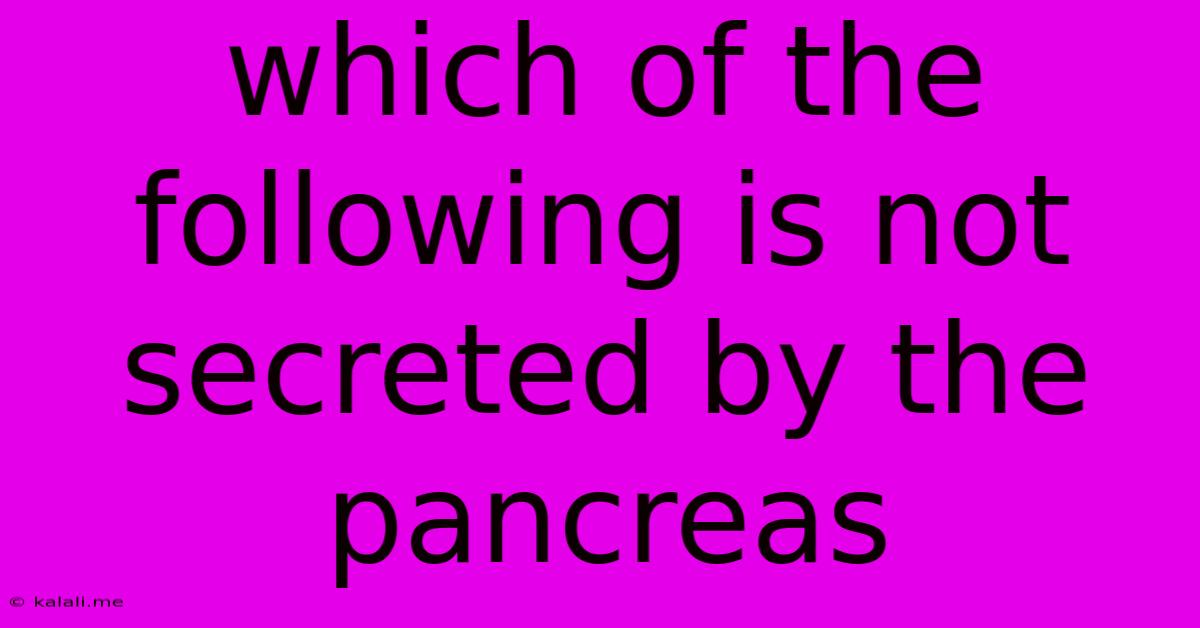Which Of The Following Is Not Secreted By The Pancreas
Kalali
Jun 13, 2025 · 3 min read

Table of Contents
Which of the Following is NOT Secreted by the Pancreas? Understanding Pancreatic Functions
The pancreas, a vital organ nestled behind the stomach, plays a crucial role in digestion and blood sugar regulation. It performs these functions through the secretion of various enzymes and hormones. This article will explore the key pancreatic secretions and identify which of the commonly listed substances is not produced by this remarkable organ. Understanding pancreatic function is key to appreciating its importance in overall health.
The pancreas has two main functions: an exocrine function and an endocrine function. The exocrine function involves the secretion of digestive enzymes into the duodenum (the first part of the small intestine), while the endocrine function relates to the production and release of hormones directly into the bloodstream.
Exocrine Secretions of the Pancreas:
The exocrine portion of the pancreas produces a crucial mixture of enzymes vital for digestion. These include:
- Amylase: This enzyme breaks down carbohydrates (starches and sugars) into simpler sugars for absorption.
- Lipase: Essential for the digestion of fats. It breaks down triglycerides into fatty acids and glycerol.
- Proteases (e.g., trypsin, chymotrypsin, carboxypeptidase): This group of enzymes works together to break down proteins into smaller peptides and amino acids. These are released in inactive forms (zymogens) to prevent self-digestion of the pancreas.
- Bicarbonate ions (HCO3-): These neutralize the acidic chyme entering the duodenum from the stomach, creating an optimal pH for enzyme activity in the small intestine. This alkaline environment is critical for the proper functioning of digestive enzymes.
Endocrine Secretions of the Pancreas:
The islets of Langerhans, clusters of cells within the pancreas, are responsible for the endocrine function. They produce crucial hormones that regulate blood sugar levels:
- Insulin: Lowers blood glucose levels by promoting glucose uptake by cells.
- Glucagon: Raises blood glucose levels by stimulating the breakdown of glycogen (stored glucose) in the liver.
- Somatostatin: Inhibits the release of both insulin and glucagon, helping regulate the overall process of blood sugar control.
- Pancreatic polypeptide: Plays a role in regulating appetite and digestive processes. Its exact functions are still being researched.
Which Substance is NOT Secreted by the Pancreas?
Considering the above, several substances could be presented in a multiple-choice question. However, a substance often not secreted by the pancreas is gastrin. Gastrin is a hormone primarily produced by the stomach's G cells. It stimulates the secretion of gastric acid (HCl) and pepsinogen, playing a key role in initiating digestion in the stomach. The pancreas does not produce this hormone; its role is focused on later stages of digestion in the small intestine.
Understanding Pancreatic Dysfunction:
Problems with pancreatic function can lead to various digestive disorders and metabolic issues. Conditions like pancreatitis (inflammation of the pancreas), cystic fibrosis (affecting enzyme secretion), and diabetes (related to insulin production) highlight the critical role of the pancreas in maintaining overall health.
By understanding the specific secretions of the pancreas, we can better appreciate its significance in maintaining proper digestion and metabolic homeostasis. Knowing that gastrin originates in the stomach, not the pancreas, is a key piece of knowledge in differentiating the functions of these crucial digestive organs.
Latest Posts
Latest Posts
-
Which Of The Following Are Characteristics Of Prokaryotes
Jun 14, 2025
-
Census Data Is An Example Of Primary Data
Jun 14, 2025
-
What Is The Lcm Of 6 8 And 9
Jun 14, 2025
-
What Is The Prime Factorization Of 86
Jun 14, 2025
-
What Is The Lcm For 36 And 45
Jun 14, 2025
Related Post
Thank you for visiting our website which covers about Which Of The Following Is Not Secreted By The Pancreas . We hope the information provided has been useful to you. Feel free to contact us if you have any questions or need further assistance. See you next time and don't miss to bookmark.